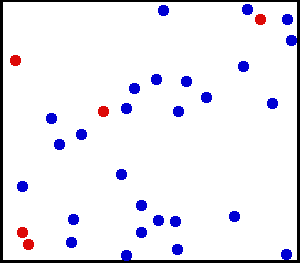Heat

Moving atoms
Although heat can be experienced and measured with a thermometer, it cannot be cut into pieces nor can it be wrapped in a paper bag.
History
For the ancient Greeks, cold and heat were philosophical concepts that were inseparable.The German physician Georg Ernst Stahl (1660 - 1734) postulated the existence of "phlogiston" as the carrier of heat. This theory was refuted by the French chemist Antoine Lavoisier (1743 - 1794).
The Prussian physicist Rudolf Julius Emmanuel Clausius (1822 - 1888) is the founder of the modern kinetic gas theory, according to which heat is the observable effect of the kinetic energy of vibrating and colliding atoms in a substance (see Figure). Ultimately, the thermal energy is distributed equally among all atoms in the substance.